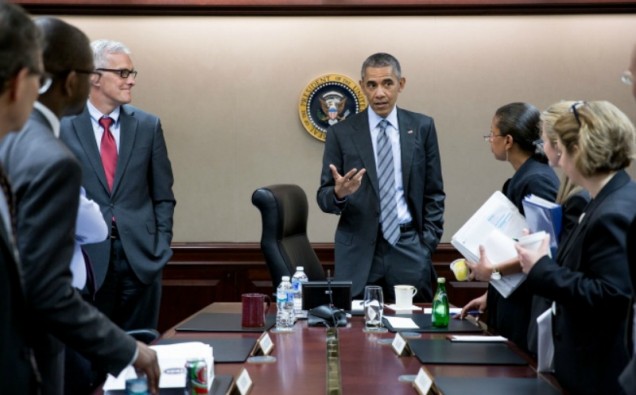
President Barak Obama was in Europe this week to give a push to negotiations for a trade deal with Europe that aims to promoting trade and multilateral economic growth.
Into last months of his presidency, the U.S. leader is an avowed advocate of free trade deals he believes will spur economic growth not just in partner countries but in the world at large. The visit was aimed at pushing negotiations for an agreement before he leaves the White House later this year.
First in the U.K. and later in Germany, Obama talked about promoting jobs and stronger growth through “increased transatlantic trade and investment”, receiving support from his allies, British Premier David Cameron and German Chancellor Angela Merkel.
The proposed Transatlantic Trade and Investment Partnership (TTIP) between the U.S. and the European Union is seen as a companion agreement to the 12-nation Trans-Pacific Partnership (TPP) signed by the U.S. and Asia Pacific countries early this year.
The TTIP is forecast to boost the EU’s economy by 120 billion euros ($1.3 trillion) and that of the US economy by 90 billion euros. There have been fears by its opponents though that it would lead to job losses and impact labor standards.
Like TTIP, the TPP seeks to liberalize trade and investment and is seen, by its proponents, to boost economic growth and jobs through expanded trade and investment opportunities. And, like TTIP, the TPP has too drawn criticisms from its opponents, including Democratic Presidential candidates Hillary Clinton and Bernie Sanders, that it will hurt US jobs and efforts to raise minimum wages.
Notwithstanding the merits and demerits of both TTIP and TPP, world economic power houses and major trade blocks need to put their acts together to push global economic growth that the International Monetary Fund says has been “too slow for too long”.
IMF this month cut its global economic growth forecast for the fourth time in a year, saying the world economy will grow 3.2 percent in 2016 and was vulnerable to shocks such as sharp currency devaluations and worsening geopolitical conflicts. For 2017, the IMF has forecast 3.5 percent growth for the global economy, down 0.1 percentage point from its January estimate.
While the global economic outlook remained weakened, the IMF believes that somewhat firmer oil prices, reduced pressure on outflow from China and actions by major central banks have all improved sentiments.
“Building on these recent positive developments, the global economy can get back on a stronger and safer track, but current policy response will need to go further,” the IMF said in a report issued this weekend.
For this to happen, the IMF is pushing for a three-pronged approach with monetary, fiscal and structural actions that, it believes, can avert recession risks and enhance financial stability.
The monetary policy stance in advanced economies which the IMF deems as “appropriately accommodative” needs to continue where output gaps are negative and inflation is too low. This should be accompanied with policies to spur demand. Where possible, exchange rate flexibility should be used to cushion the impact of terms of trade shocks.
On the fiscal policy front, the IMF calls on countries with high debt to implement their fiscal consolidation plans to support global demand. Those with without fiscal space, the countries need to aim for a more growth-friendly composition of revenue and expenditure, particularly increased spending in infrastructure in some countries. Along with monetary and fiscal policies’ support, the IMF has also stressed structural reforms to improve productivity.
“Each country should commit to a set of policy actions – as determined by available policy space – that contributes to global package of reforms to life both national and global growth,” says the IMF.
On its part to, to propel the global growth, the IMF said it will make its financial resources available to “underpin more forceful policy implementation while preserving financial stability and protecting those that are vulnerable to the current environment”.
In addition to that, the IMF will facilitate efficient infrastructure spending and support healthier private sector balance sheets. The Fund will also contribute to facilitate the adoption of financial regulatory reforms in member countries.












